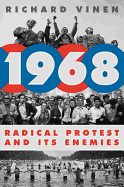
In 1968: Radical Protest and Its Enemies, Richard Vinen provides a fresh synthesis of a historically turbulent year. He focuses on the Western world, particularly the United States, Great Britain, France and West Germany, where universities became hotbeds of radicalism and discontent that fueled spectacular demonstrations and sometimes violence. Vinen references the "long '68"--"the variety of movements that became associated with, and sometimes reached their climax in, 1968 but that cannot be understood with exclusive reference to that year"--as he also traces the counterrevolutions it fostered.
A number of social and political pressures boiled over into radical protest that year. Opposition to the Vietnam War proved a crucial catalyst in the United States and Europe, as did the civil rights movement, dissatisfaction with consumerism and distrust of mainstream political parties. The relatively affluent baby boomer generation attended college in record numbers, sometimes joining radical groups. Students' interests coincided to some degree with the concerns of trade unions and the working class, but there was enough daylight between students and workers, regarding social issues, ideology and methods of protest, for shrewd politicians to exploit. The remarkable outbursts of 1968 were, after all, bookended in many countries by impressive displays of support for the status quo, typified in the U.S. by the election of Richard Nixon as president in November 1968.
Vinen does not provide a definitive answer to what 1968 "meant," but he does provide an exceptionally clear-eyed overview of a pivotal year. --Hank Stephenson, bookseller, Flyleaf Books, Chapel Hill, N.C.

